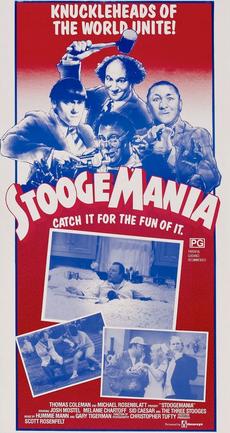| Stoogemania | |
|---|---|
 Theatrical release poster | |
| Directed by | Chuck Workman |
| Written by | Jim Geoghan Chuck Workman |
| Produced by | Michael Rosenblatt James Ruxin Chuck Workman |
| Starring | Josh Mostel Melanie Chartoff Sid Caesar Paul Garner Mark Holton |
| Cinematography | Christopher Tufty |
| Edited by | James Ruxin |
| Music by | Hummie Mann |
| Distributed by | Atlantic Releasing Corporation |
Release date |
|
Running time | 83 minutes |
| Country | United States |
| Language | English |
Stoogemania is a 1986 comedy film, directed by Chuck Workman and starring Josh Mostel as a huge fan of The Three Stooges for whom the line between reality and fiction begins to blur. Stoogemania was made in an attempt to cash in on the Three Stooges' resurgence in popularity during the 1980s, thanks to syndication and the hit novelty song "The Curly Shuffle" by Jump 'n the Saddle Band. The film experienced a brief theatrical release and was poorly received by critics.
Contents
In the United Kingdom, the film was released under the title Party Stooge.